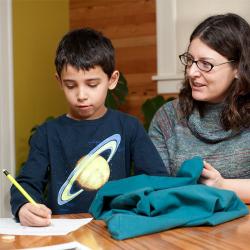Source Institutions
Source Institutions
Add to list Go to activity
Activity link broken? See if it's at the internet archive

In this activity, learners describe an object they can’t see. After someone picks outs a few mystery objects and places them in a pillowcase, learners will investigate using only their hands. After drawing the objects they feel, learners will compare their work to the revealed contents of the pillowcase. This activity connects the field of nanotechnology by acting as a model for a special tool called a scanning probe microscope. This tool lets scientists “feel” things that are too small to see with regular microscopes. Step-by-step instructions are included with photos along with safety recommendations. Activity guide includes a "What's going on?" explanation and quick connections to seeing and manipulating atoms with a scanning probe microscope.
- 5 to 10 minutes
- 10 to 30 minutes
- $5 - $10 per group of students
- Ages 4 - adult
- Activity
- English
Quick Guide
Materials List (per group of students)
- Pillow case (or other opaque sack-like bag)
- Assorted small objects (such a letter blocks, rubber balls, small plastic animals or toys)
- Paper (you can use the print out provided)
- Pens or pencils
- Bandana or eye-mask (optional)
- Mystery Shapes Activity Sheet (optional)
Subjects
-
Engineering and Technology
-
Engineering
- Nanotechnology
-
Engineering
-
Life Sciences
-
Human Senses and Perception
- Touch
-
Human Senses and Perception
-
Physical Sciences
- Structure and Properties of Matter
Audience
To use this activity, learners need to:
- touch
Learning styles supported:
- Involves hands-on or lab activities
Other
Components that are part of this resource:
This resource is part of:
- Do It Yourself Nano activities and experiments
- DIY Nano HD
- DIY Nano e-book with photos and activities
Access Rights:
- Free access
By:
- Sciencenter
Source Collection
- NISE Network
Rights:
- Creative Commons: Non-commercial Share Alike (by-nc-sa), Sciencenter, 2013
Funding Source:
- National Science Foundation
